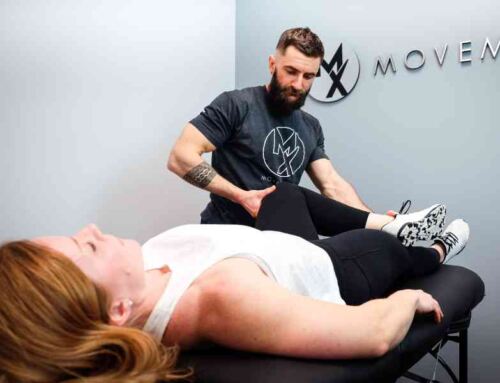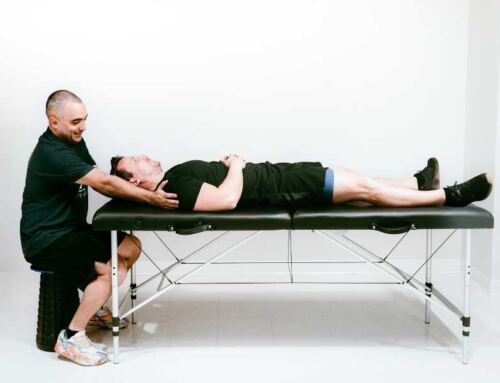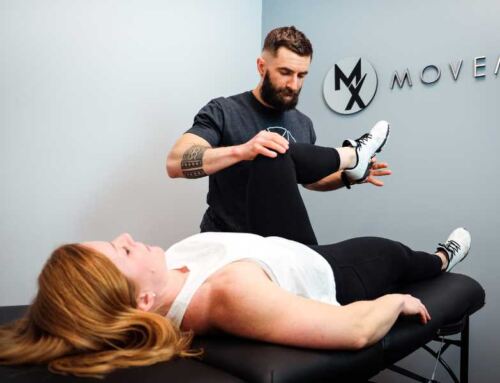Understanding TMJ Pain: Top 9 Risk Factors and How to Manage Them
Okay, so you’ve established you have TMD. Great first step! Let’s hope you’ve found your way to getting some help from a provider who specializes in treating orofacial pain.
But now your brain wanders… What caused this?
Was I doomed from birth, or is this something I could have prevented? Let’s dive into some common risk factors that play a role in the development of TMD.
1. Stress
Ah yes, that word we all know so well but wish we spoke of less. Stress can both precede jaw pain as well as influence the severity of your symptoms. Nearly 50% of patients with TMD admit to having psychosocial distress, with many of these patients having a diagnosis of depression and anxiety.
Mix pain into that equation, and you can imagine how distressing that can be on your body and mind. People with TMD often experience chronic symptoms, so proper management of stress is crucial for treatment. A common habit that occurs consciously or subconsciously in this population as a result of stress is bruxism.
2. Bruxism
Bruxism, also known as “clenching” is a very common behavior that can lead to issues with your jaw. Did you know that just three little muscles in your jaw can generate up to 265 pounds of force?
Even though these muscles were designed to be able to handle a lot of load so you can chew your food, it also lends itself to being vulnerable to injuries. Just like other areas of the body, it can make these muscles prone to overuse injuries, inflammation and also cause more stress to your joint and the soft tissue structures (like ligaments) surrounding it.
Controlling daytime and nighttime clenching becomes very pertinent to the management of TMD.

3. Sleep apnea or other breathing disorders
Has anyone ever told you that you snore? Or maybe you’ve been diagnosed with obstructive sleep apnea? It may come as a surprise to some, but this can directly influence your jaw pain.
You see, your airway collapses during sleep apnea, and your brain has to find a way to get oxygen in. The result: pushing your mandible (lower jaw) forward in order to open the airway so you can breathe. This movement of your jaw jutted forward causes increased stress and strain to the TMJ, as well as causes an increase in tension of the surrounding musculature.
In addition, this also affects your tongue posture, as you must drop your tongue to the floor of your mouth to breathe. By the way, that’s not where your tongue should be! Other breathing problems that result in mouth breathing can cause the same issues during daytime as well.
This could look like enlarged tonsils, a deviated septum, or chronic nasal congestion or sinus infections, which can all lead to increased mouth breathing and poor oral posture. Not to mention, your body isn’t getting the restful sleep that we know is needed for optimal health! Yikes!
4. Hypermobility
Remember those friends you had growing up who were “double jointed”? They likely had some form of hypermobility! Patients that present with hypermobility conditions are often more likely to experience issues with their jaw. Why, you may ask? Let’s not forget what that “J” stands for in TMJ—joint!
Yes, your TMJ is a joint, and just like other areas of the body that might be hyperflexible, your jaw can have this superpower as well. Although, this superpower might actually give you more issues. With hypermobility, surrounding jaw ligaments can become excessively lax, causing issues with instability.
This can affect the discs that live in between the joints, which causes them to move out of their optimal place, resulting in jaw issues. Common symptoms include painful popping upon opening or closing, pain with yawning, or having to manipulate your jaw in order to open wide or to close. If you’re hypermobile in other areas of your body, this does place you at an increased risk for issues in your jaw as well.
5. Postural Faults
Posture. Ugh. Did you read that word and immediately straighten up? Turns out, posture can greatly influence the amount of stress that occurs to your jaw. Have you ever caught yourself driving somewhere new, high traffic, your shoulders are rounded forward, your head is poking out like a turtle so you can be more vigilant, and you may even be clenching your jaw?
These are common postures that people assume during the day (especially people who are behind a screen for most of the day), that greatly affect the relationship of your head, neck, jaw, and tongue. Part of the treatment for TMD addresses these postural faults and focuses on strengthening proper musculature to support optimal resting posture of your head, jaw, neck and shoulders.
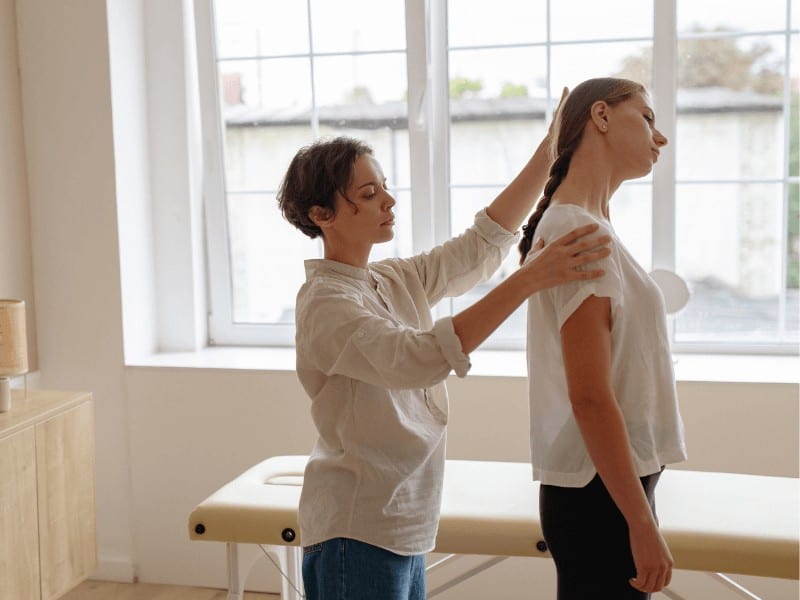
6. History of trauma or previous injury to the head, neck or jaw
When you think of the word “trauma”, your mind probably invisions something catastrophic like a blow to the face or a really bad car accident where the car was totaled. And yes, those would definitely be classified as “trauma”, but trauma can also look like hours of dental work where you had to keep your mouth open, or having braces for an abnormally long time, or even the littlest fender bender in the parking lot that gave you a neck ache.
Any experience where your jaw or face was compromised and the result was pain, does place you at a higher risk for TMD, and it’s not uncommon for it to present itself later in life (yep, even years later).
7. Gender
Women are twice as likely to develop jaw pain and dysfunction than men. Add it to the list, right? There are different theories out there as to why including hormones or just being more proactive about seeking treatment for pain. But at the end of the day, being female is a risk factor for developing TMJ pain.
8. Age
For many years the research has supported that TMD was primarily affecting people (women more) ages 18-44. While this age group is still definitely affected, more recent studies have shown that middle aged and elderly populations are actually the most affected by TMD.
As we age, we can develop arthritis and other degenerative conditions just like in other areas of our body, and the jaw is no exception. In addition, the more “wear and tear” we put on our jaw, the more likely you are to experience some of those pesky disc issues (popping and clicking) that can become more of a problem when combined with degeneration.
Rest assured, whether you’re a college student or a retiree, conservative treatment can help all ages of people struggling with orofacial pain.
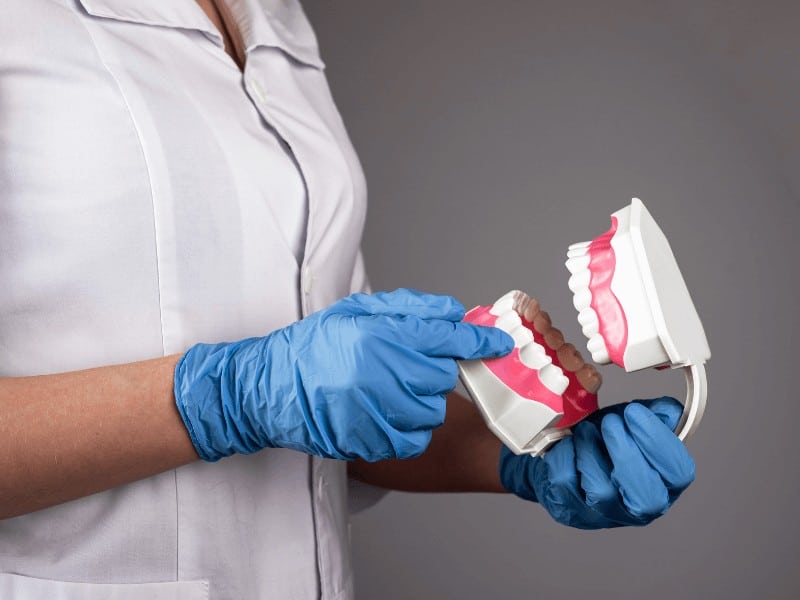
9. Malocclusion
This is a bit of a hot topic. Some specialists out there believe that your “bite” is what causes TMJ issues, others believe that it may have started the issue, but it is not a barrier for treatment. Meaning, that fixing your bite via surgery or orthodontics is not necessarily going to cure your TMJ pain.
Regardless of your belief, there are definitely certain occlusions (“bites”) that predispose you to having more issues with your jaw. These occlusions would be things like a cross bite or a deep overbite. Certainly an underbite could create some issues as well. There are also many different perspectives on what can increase your risk for a “bad bite”, including certain pacifiers used as a baby, thumb sucking, etc. More on that in the future!
Conclusion
Were you doomed for TMJ issues from birth? You may notice that you have some of these risk factors that are out of your control, but there are also many other risk factors that involve some “bad habits” or things that you can control, which are often what bring patients to my office. The important thing to remember is that regardless of what risk factors you may have (high stress job, sleep apnea, “bad” bite), physical therapists can help you with your TMD!
We spend ample time going over strategies to help you improve those faulty habits, work on stress reduction, breathing exercises, and provide you with a custom home program to improve your head, neck and jaw muscle and joint function. All in addition to the hands-on treatment that you might not be comfortable doing yourself. Just make sure that before you see a physical therapist, you consult with them to ensure that they are experienced and have specialized training with TMD and Orofacial pain.
References
- Kraus, S. (2023). Evaluation and Management of Temporomandibular Disorders with Cervical Spine Considerations [www.TMDstevekraus.com].
- Mannheimer, J. (2021). Comprehensive Evaluation and Treatment of the Sub-Occipital, Craniofacial and Temporomandibular Complex.
- Sanders, A. E., Essick, G. K., Fillingim, R., Knott, C., Ohrbach, R., Greenspan, J. D., Diatchenko, L., Maixner, W., Dubner, R., Bair, E., Miller, V. E., & Slade, G. D. (2013). Sleep apnea symptoms and risk of temporomandibular disorder: OPPERA cohort. Journal of dental research, 92(7 Suppl), 70S–7S. https://doi.org/10.1177/0022034513488140
- Yadav, S., Yang, Y., Dutra, E. H., Robinson, J. L., & Wadhwa, S. (2018). Temporomandibular Joint Disorders in Older Adults. Journal of the American Geriatrics Society, 66(6), 1213–1217. https://doi.org/10.1111/jgs.15354
- Valesan, L. F., Da-Cas, C. D., Réus, J. C., Denardin, A. C. S., Garanhani, R. R., Bonotto, D., Januzzi, E., & de Souza, B. D. M. (2021). Prevalence of temporomandibular joint disorders: a systematic review and meta-analysis. Clinical oral investigations, 25(2), 441–453. https://doi.org/10.1007/s00784-020-03710-w



